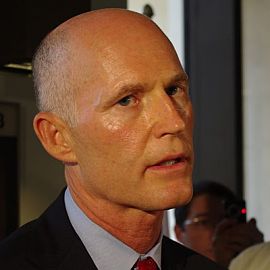Gov. Rick Scott warned the Florida Board of Governors to tread carefully this week as they consider tuition requests that would boost the cost of going to most public universities by up to 15 percent.

Two days before the board is set to take up recommendations that would increase tuition by 15 percent at eight of 11 universities, Scott reiterated his hesitance about those increases at a lunch with board members.
Scott acknowledged that the board faces difficult choices as universities face dwindling state resources.
“I think that the easiest thing is to just say let’s raise the cost of living in our state,” Scott said. “But unfortunately, there’s a day of reckoning. At some point, we can’t afford it.”
Eight universities have asked for the full 15 percent tuition increase allowed under the state’s “differential tuition” law. The University of Florida has requested 9 percent, the University of South Florida has asked for 11 percent and Florida Gulf Coast University’s board voted Tuesday to ask for 14 percent. Draft documents posted to the Board of Governors’ website had indicated FGCU might request the full 15 percent.
Scott did not directly answer questions after the meeting about whether he would vote for the increases if he were a member of the board. But he said the Board of Governors should focus on affordability, the return on investment on any new revenue and how well students are being prepared for the workforce.
“I want the dollars invested where these students are getting jobs,” he said. “Right now, it’s science, technology, engineering and math. I want to make sure the dollars are spent there. So when these students get out of school, I want them to be able to get a job.”
Universities have said they need the increase in tuition to help offset $300 million in state cuts for the coming fiscal year. State officials have said those cuts are only meant to be a one-time reduction and that the schools are supposed to plug them by drawing down money from savings.
“If you look at what we did, what the Legislature did is, they reduced their reserves,” Scott said.
But in a series of presentations to the board outlining their plans for the coming year, university presidents stressed the ways they have cut operational costs over the last several years of budget cuts. University of Central Florida President John Hitt said his institution had tightened its proverbial belt considerably.
“I figure we’ve gone down to a belt size of about 22,” he quipped.
After his presentation, Hitt told reporters that the tuition increase wouldn’t cover all of UCF’s $52 million cut. And he said much of the money that Scott and lawmakers portrayed as “reserves” were, in fact, pledged to some university expenses.
“It’s not just mad money,” he said. “It’s not like I have a savings account for a rainy day.”
How much impact Scott’s words would have remains an open question; the full board is not set to vote on the tuition requests until Thursday afternoon. But Chairman Dean Colson said the governor had earlier made board members aware of his concerns, so most members were likely already considering them.
“We should all take seriously what our governor says to us,” Colson said. “But I think we all have a fiduciary obligation to the system and to the citizens that’s independent of our relationship with the governor. And so everybody’s going to do what I think they would have done anyway.”
Hitt wouldn’t speculate on whether the board would be less willing to approve tuition increases because of Scott’s remarks. He did say he felt like the board asked more questions this year.
“But I was the 11th of 11 last year,” Hitt said, laughing. “And they were tired.”
By Brandon Larrabee


